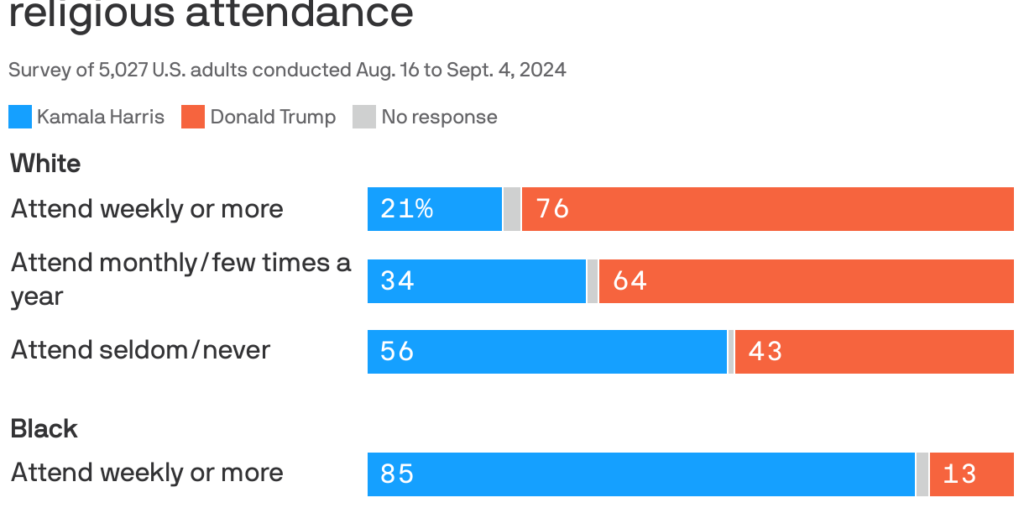
Weekly church attendees who are white largely favor Donald Trump, while Black churchgoers tend to back Vice President Kamala Harris, according to a new survey.
Why it matters: Beyond familiar racial voting patterns, the survey reflects Americans’ stark differences in interpreting Christianity through the lens of race and politics.
The big picture: Trump and Harris have been visiting churches to tap into the shrinking but crucial Christian voting blocs, particularly in pivotal swing states.
- Trump was in Michigan this month for an event with “Believers for Trump,” a movement that aims to energize right-leaning white Christian voters, especially in swing states.
- Harris attended a church service in Philadelphia on Sunday and traveled to Georgia last week to visit two Black churches as part of the “Souls to the Polls” movement, a nonpartisan faith-based initiative aimed at increasing turnout among Black voters.
By the numbers: White Americans who attend religious services weekly or more often are significantly more likely to support Trump (76%) than Harris (21%), according to the survey by the nonpartisan Public Religion Research Institute (PRRI) and the Brookings Institution.
- Among Black Americans, religious service attendance has the opposite effect. Those who attend religious services more regularly are less likely to support Trump (13%) and overwhelmingly support Harris (85%).
- Somewhat similar to white Americans, Latinos who attend services weekly or more say they are more likely to vote for Trump (55%) than Harris (41%).
Yes, but: White Americans who seldom or never attend religious services are more likely to support Harris than Trump.
- Among Black Americans who seldom or never attend religious services, support for Trump nearly doubled to 23% compared to Black Americans who go to church often.
- Latinos who seldom or never attend religious services are significantly more likely to support Harris (65%) than Trump (33%), the survey said.
Between the lines: Previous polls looked at the “God gap” in politics and assumed all regular churchgoers mostly voted Republican, but those surveys didn’t break churchgoers down by race, Robert P. Jones, president and founder of PRRI, told Axios.
Zoom out: Trump — who describes himself as Presbyterian — rarely talks about any religious experience or personal theology — beyond suggesting God may have saved him from a would-be assassin’s bullet in July.
- He often bungles or misidentifies passages from the Bible, though he does sell Bibles. He’s also said he doesn’t think he’s ever asked God for forgiveness.
Harris, who grew up attending a Black Baptist church and a Hindu temple — reflecting the religions of her parents — told Anderson Cooper during a CNN town hall last week that she prays every day, sometimes twice.
- “I was raised to believe in a loving God, to believe that your faith is a verb, you live your faith.”
Background: White Christian evangelicals since the 1980s have mobilized around GOP candidates, while Black churches since the civil rights movement have rallied for Democrats.
- White Christian evangelicals emphasize personal salvation and strict social norms around gender. Black churches focus on deeds and the “Social Gospel” of helping the poor, immigrants and the less fortunate.
What they’re saying: The Rev. Nicole M. Barnes, director of civic engagement at Faith in Action, tells Axios that Black pastors translate what policies mean for the community, especially among Black churchgoers.
- “For centuries, when everything around them was ever-changing, the Black church was a place that people could go to.”
- Harris recently visited Divine Ministries in Jonesboro, Ga., attracting a crowd of young people, families and “working-class folks in that area,” LaTosha Brown, co-founder of Black Voters Matter, tells Axios.
- “It’s an information center for us, and it brings a lot of credibility….I think it was a smart, strategic move by the campaign.”
Methodology: The American Values Survey was conducted online Aug. 16-Sept. 4. The poll is based on a representative sample of 5,027 adults (age 18 and older) living in all 50 states and the District of Columbia who are part of Ipsos’ Knowledge Panel®.
- The margin of sampling error is +/- 1.82 percentage points at the 95% confidence level, for results based on the entire sample.

